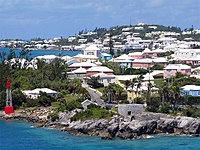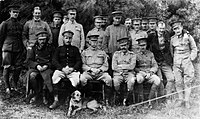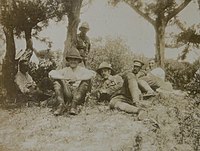Bermuda
Bermuda (/bərˈmjuːdə/; historically known as the Bermudas or Somers Isles) is a British Overseas Territory in the North Atlantic Ocean. The closest land outside the territory is in the American state of North Carolina, about 1,035 km (643 mi) to the west-northwest.
This article is about the British Overseas Territory. For other uses, see Bermuda (disambiguation).
Bermuda
1609 (officially becoming part of the Colony of Virginia in 1612)
- 52% Black
- 31% White
- 9% Multiracial
- 4% Asian
- 4% others
- Bermudian
- Bermudan
53.2 km2 (20.5 sq mi)
27
79 m (259 ft)
63,779
1,338/km2 (3,465.4/sq mi) (10th)
2019 estimate
US$117,097 (4th)
![]() 0.981
0.981
very high
dd/mm/yyyy
left
Bermuda is an archipelago consisting of 181 islands, although the most significant islands are connected by bridges and appear to form one landmass. It has a land area of 54 square kilometres (21 sq mi). Bermuda has a sub-tropical climate, with mild winters and warm summers. Its climate also exhibits oceanic features similar to other coastal areas in the Northern Hemisphere with warm, moist air from the ocean ensuring relatively high humidity and stabilising temperatures. Bermuda lies in Hurricane Alley and thus is prone to severe weather; however, it receives some protection from a coral reef and its position at the north of the belt, which limits the direction and severity of approaching storms.
Bermuda is named after Spanish explorer Juan de Bermúdez, who discovered the archipelago in 1505. The islands have been permanently inhabited since 1612 when an English settlement was established at St. George's. Forming part of British America, Bermuda was governed under Royal charter by the Somers Isles Company until 1684, when it became a crown colony. The first enslaved Africans were taken to Bermuda in 1616. The Somers Isles Company ensured a steady flow of free but indentured servants until 1684, and most tobacco farms owned by overseas adventurers were sold to the tenants or other occupants after Bermuda-grown tobacco became steadily less profitable following the 1620s, becoming family farms that switched from growing tobacco for export to producing food (initially for local consumption).[6] Consequently, a plantation economy did not develop and the slave trade largely ceased by the end of the 17th century.[7] The economy instead became maritime-focused, with the colony serving as a base for merchants, privateers and the Royal Navy, giving its name to the Bermuda rig and Bermuda sloop. It became an imperial fortress, the most important British naval and military base in the western hemisphere with vast funds lavished on its Royal Naval Dockyard and military defences until the 1950s. Tourism has been a significant contributor to Bermuda's economy since the 19th century and after World War II, the territory became a prominent offshore financial centre and tax haven.
Divided into nine parishes, Bermuda is a self-governing parliamentary democracy with a bicameral parliament located in the capital Hamilton. The House of Assembly dates from 1620, making it one of the world's oldest legislatures. The premier is the head of government and is formally appointed by the governor, who is nominated by the British government as the representative of the King. The United Kingdom is responsible for foreign affairs and defence. An independence referendum was held in 1995 with a large majority voting against independence. As of 2019, Bermuda had a population of around 64,000 people, making it the second-most populous of the British Overseas Territories. Black Bermudians, a diverse population primarily of any mixture of African, European, and Native American ancestry,[8][9] make up around 50% of the population, while White Bermudians, primarily of British, Irish and Portuguese descent, make up 30% of the population. There are smaller groups from other races or identifying as mixed race and about 30% of the population is not Bermudian by birth. The last remaining colony in the former British North America (following the 1867 Confederation of Canada and the Colony of Newfoundland becoming the Dominion of Newfoundland in 1907), Bermuda has a distinct dialect of English and has historically had strong ties with other English-speaking countries in the Americas, including the United States, Canada, and the Commonwealth Caribbean. It is an associate member of the Caribbean Community.
Etymology[edit]
Bermuda is named after the Spanish sailor Juan de Bermúdez, who discovered the islands in 1505,[1] while sailing for Spain from a provisioning voyage to Hispaniola in the ship La Garça.
The Bermuda Education Act 1996 requires that only three categories of schools can operate in the Bermuda Education system:[189]
Prior to 1950, the Bermuda school system was racially segregated.[190] When the desegregation of schools was enacted in 1965, two of the formerly maintained "white" schools and both single-sex schools opted to become private schools. The rest became part of the public school system and were either aided or maintained.
There are 38 schools in the Bermuda Public School System, including 10 preschools, 18 primary schools, 5 middle schools, 2 senior schools (The Berkeley Institute and Cedarbridge Academy), 1 school for students with physical and cognitive challenges, and 1 for students with behavioural problems.[191] There is one aided primary school, two aided middle schools, and one aided senior school. Since 2010, Portuguese has been taught as an optional foreign language in the Bermudian school system.[192][193]
For higher education, the Bermuda College offers various associate degrees and other certificate programmes.[194] Bermuda does not have any Bachelor-level colleges or universities. Bermuda's graduates usually attend Bachelor-level universities in the United States, Canada and the United Kingdom.[195]
In May 2009, the Bermudian Government's application was approved to become a contributory member of the University of the West Indies (UWI). Bermuda's membership enabled Bermudian students to enter the university at an agreed-upon subsidised rate by 2010. UWI also agreed that its Open Campus (online degree courses) would become open to Bermudian students in the future, with Bermuda becoming the 13th country to have access to the Open Campus.[196] In 2010, it was announced that Bermuda would be an "associate contributing country" due to local Bermudian laws.[197]



